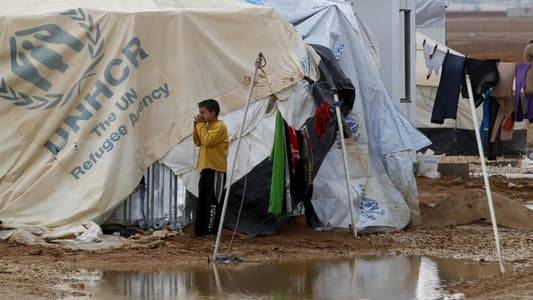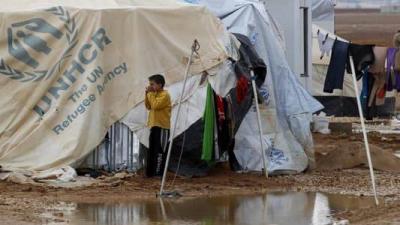A number of Syrian displaced persons have received text messages from the United Nations High Commissioner for Refugees (UNHCR) and the World Food Program informing them of the suspension of financial assistance provided to them in Lebanon. While some have linked this decision to the Lebanese government's pressure on the international community to encourage the voluntary return of displaced individuals, the UNHCR has stated that this measure is "routine" and not new, and it is not related to the issue of returning displaced individuals to Syria. Therefore, it is not expected to drive a larger number of displaced persons to leave Lebanon and return to their homeland, as this return is still tied by the international community to a comprehensive political solution in Syria or to the availability of conditions deemed safe and encouraging from their perspective. Consequently, Lebanon will continue to bear this burden with some "painkillers" from the international community, such as the recent decision made by the Executive Board of the World Food Program to allocate its project in Lebanon for 2023-2025 equally between Syrian displaced persons and Lebanese citizens, after it was previously divided with 70% for displaced persons and 30% for Lebanese citizens.
The decision to stop assistance for some Syrian displaced persons in Lebanon will take effect starting January 2023. Consequently, about 78% of Syrian refugee families in Lebanon (234,000 families) will receive monthly cash assistance, including from the UNHCR, the World Food Program, and non-governmental organizations, while currently about 90% of Syrian refugee families in Lebanon (269,000 families) receive this assistance. Most of the families that will stop receiving assistance will be replaced by newly selected families who have not received assistance yet. However, due to insufficient resources to meet increasing needs, the total number of families receiving monthly cash assistance will decrease by 35,000 families in 2023.
Regarding the reasons for this decision, UNHCR spokesperson in Lebanon, Lisa Abu Khalid, explained in a statement to "Nidaa Al-Watan" that "the UNHCR and the World Food Program are preparing the cash assistance program for 2022/23. Due to financial constraints, the UNHCR and the program must continue to prioritize cash and food assistance for families identified as the most economically vulnerable. Each year, the UNHCR and the World Food Program conduct an exercise to review the vulnerabilities of refugee families to ensure that the criteria they use align with the social and economic realities in the country." Based on this, and according to the latest review of family situations, some families were not selected to receive assistance for the coming year, while families that previously did not receive assistance have been added as new beneficiaries. However, refugees who have been informed that they will no longer receive cash or food assistance may still be eligible for other assistance programs.
This decision is routine and made annually, and total assistance may not be completely withheld from the displaced individuals who were excluded, but only some may be stopped while they continue to receive others. Abu Khalid explained that "the financial resources available to the UNHCR and the World Food Program allow for assistance to a limited number of families, and we acknowledge that we are not supporting all who need assistance. However, only some refugees will cease to receive monthly assistance for the basic needs provided by the UNHCR or the World Food Program, while they may continue to receive help from the World Food Program for covering the food needs of each family member. Other families may continue to receive basic assistance but may not obtain food assistance from the World Food Program. Additionally, some families may not receive monthly cash assistance for their basic needs but may continue to receive winter aid." Those displaced will be informed of any changes to the assistance they receive accordingly.
While Lebanon is counting on any measures that encourage displaced individuals to return to Syria, considering that the international assistance granted to them in Lebanon is among the main factors encouraging them to remain in the country and in displacement camps rather than returning to their homeland, Abu Khalid confirmed that the suspension of assistance for some displaced persons "is not related to the issue of return, and this process is not new but occurs annually, to ensure that the assistance we can provide based on available resources reaches the people and families most in need and poverty."
As for the overall assistance received by Syrian displaced persons in Lebanon from the UNHCR and the monthly cash and food assistance programs of the World Food Program and other humanitarian partners, it has increased since September 2021, in light of inflation and rising prices, such that the cash provided is one million Lebanese pounds for each family monthly and 500,000 Lebanese pounds per individual monthly for food (with a maximum of six individuals per family, amounting to a maximum of three million Lebanese pounds for each family per month).




